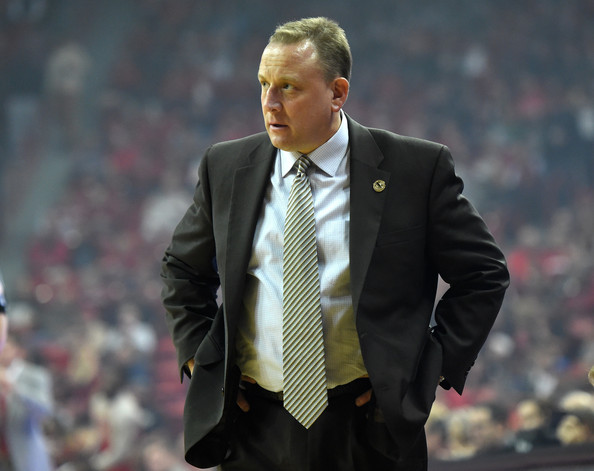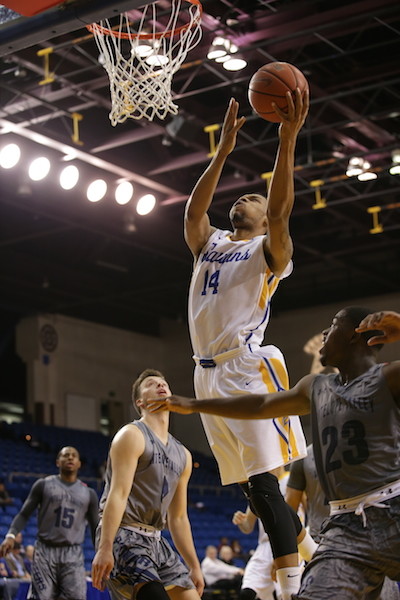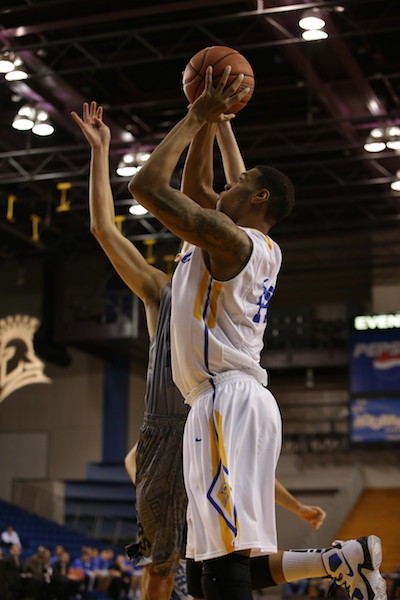Frank Rogers’ Road to Redemption at San Jose State
Posted by Andrew Murawa (@Amurawa) on December 17th, 2015Even if you consider yourself a college basketball fan, there’s a good chance you don’t know the name Frank Rogers. If you have ever heard the name, you’ve got a great memory and it probably came up for a reason that Rogers would rather have you forget. In mid-December last season, San Jose State head coach Dave Wojcik indefinitely suspended five of his players. Two of those players returned after missing three games; Rogers — at the time of his suspension a 6’9” junior who was the team’s third-leading scorer — was among the other three who did not. During the ensuing offseason, he wasn’t listed on the team’s roster. After a season in which San Jose State suffered the indignity of a winless conference season and a year where its only two wins were over non-Division I opponents, it appeared from the outside that Rogers and the program had gone their separate ways. If you figured he was a guy you’d never hear from again, you probably weren’t alone.
Flash forward to the Spartans’ second game of the season where it hosted a good Montana team coming off a 20-win season. After San Jose State took a 12-point lead into the half, the Grizzlies had fought all the way to within a point with under two minutes remaining. It looked like an all too familiar scene for the Spartans. A Brandon Clarke three was awry, but there was that guy – Frank Rogers – pulling down a big offensive board and finding his way to the basket for the hoop and harm to give his team some breathing room. On the next defensive possession, he challenged a Martin Breunig layup attempt at the rim before securing the missed attempt. By the time Princeton Onwas threw down a dunk in transition a minute later to put the finishing touches on a breakthrough win, Rogers had tallied 16 points, 10 boards, a couple assists, a steal and a block, and laid down the newest chapter in his story of personal redemption.
The meat of Rogers’ story is in between those two events. He was officially dismissed from the program by Wojcik on January 12 for violating team rules. “He did some things that he probably shouldn’t have done,” was as much as Wojcik wanted to say. “He made some poor decisions.” Rogers also didn’t want to go into specifics, but admitted he made mistakes that he regrets. And to his credit, he took his dismissal as a wake-up call. “My mother passed away when I was in high school and her death is something that I have battled with,” said Rogers. “So to be playing basketball and to see something that I cared so much about taken away from me again, it brought me back to reality. I had to figure out a way to change for the better.”
Rogers’ personal story is awash in tragedy and loss, mixed in with perseverance. After his mother passed away while he was in high school, he went to live with his grandmother and aunt. He graduated from Salinas High School in central California and enjoyed plenty of success on the basketball court, such as earning the Monterey County Player of the Year after his senior season. Still, despite his size and his 14 point and 14 rebound average in his final season, he wasn’t exactly loaded down with scholarship offers. After a season at Cabrillo College, Rex Walters and the University of San Francisco gave him his lone Division I scholarship offer. But things didn’t work out for Rogers at USF, where he averaged less than nine minutes per game in his sole season before the player and school mutually parted. Rogers turned to the nearest local Division I school at San Jose and worked out an agreement with Wojcik to walk-on at the school, provided he would at least have a chance to play. But after putting in work over the offseason at open gyms on campus, Wojcik found reason to offer Rogers a scholarship. But, while sitting out a redshirt season as part of NCAA transfer rules, Rogers’ grandmother passed away, another loss than lingered on the young man’s heart. “As I was growing up, my grandma and her house were kind of a foundation for our family,” explained Rogers. “After she passed, we weren’t able to keep her house. It was rough, we felt like we didn’t have a home in a sense. Your home where you grew up most of your life, that goes away, that was tough dealing with.”
When Rogers’ redshirt season was behind him, he was still having trouble processing the losses in his life and the pressure of Division I basketball, collegiate academics and his personal issues. Under those pressures, he made some mistakes. “I was still in that mindset of battling between my personal issues and trying to play basketball and I was trying to split the two,” he said. “You want to be a good teammate and be a good person for your team, but at the same time you’re dealing with your own personal issues. And the team is traveling a lot, so the people who you’re closest with, you’re not with as often. It was a hard time.”
Rogers owned up to his mistakes and spoke with Wojcik about how to get back in good standing with San Jose State and its basketball program. “When everything went down,” said Rogers, “I came to Coach Woj and told him, ‘Okay, I made my mistakes, but I don’t think that should take away from what I’m trying to do and this opportunity that I have.” So Wojcik laid down a series of mostly off-court requirements for Rogers. “He had responsibilities that he had to take care of if he wanted to get back on the team and into the program,” said Wojcik. “He did an unbelievable job. He had to stay in my good graces and he had to make good decisions off the court, not just academically, but just off the court in general.”
Rogers paid his own way to summer school over the offseason. He kept his GPA up, he kept out of trouble, he kept in touch with his coaches and he kept working on his game. “I just tried to keep on the right track and try to prove to Coach Wojcik that I was doing everything right,” he said. When Rogers’ summer school work proved successful and Wojcik was sufficiently swayed that Rogers had made positive changes, the coach spoke with athletic director Gene Blaymaier and the two decided that Rogers had earned his scholarship back.
Since then, Rogers has taken that second chance and run with it. You can see it in the numbers in the box scores. Through ten games (including four wins), Rogers has averaged 15.4 points and 8.6 boards. He’s knocked in eight threes at a 38.1% clip. He’s the last line of defense for the Spartans on one end of the court and a playmaker to run the offense through on the other end of the court. But most importantly, as a senior on a team with five freshmen for a program trying to build an identity, he’s embracing a leadership role. “Coach Woj has always pressed me to be a leader in my time here and that’s something I used to sort of fight him on, because it is tough to lead when I felt like my focus wasn’t all the way here,” said Rogers. “But after everything happened, I started doing things more than just for myself. I tried to become more of a leader in stepping outside of myself in order to help other people. That is something I didn’t do as much before. I feel like if I see somebody down I try to pick them up because I know what it is like to be down.”
“It’s a great story,” said Wojcik. “It’s all him. Obviously, he was the one who put himself in that situation to start. But he was also the one to take him out of that. It’s one of those lessons when something is taken away from you and you realize ‘Oh damn, I missed that’. You didn’t realize how much you had and how good you had it and I think that’s where Frank was and he’s been unbelievable ever since. He’s been a terrific leader and it’s shown in his play.”

Dave Wojcik’s First Two Seasons At San Jose State Have Been Challenging. (Ethan Miller, Getty Images)
And really, as impressive as the Rogers story is on the personal side, the story of a young man bouncing back from mistakes and maturing, it can also be seen as an allegory for the whole San Jose State program. When Wojcik took over the program in 2013-14, it was spending its first season in the Mountain West, an upgrade from its previous conference, but a major step up in competition for a program that had struggled to compete a level down in the WAC. To make matters worse, academic failings under the previous staff led to APR sanctions, meaning the Spartans weren’t even eligible to compete in the conference tournament last season. Throwing in last year’s 2-28 overall record and 0-18 Mountain West performance along with the player suspensions and dismissals made for salt in the wounds.
This season, nobody expects the Spartans to compete for the Mountain West title or anything, but there is no doubt progress is being made. On the academic front alone, things are significantly improved. The team’s GPA sits at 2.9, a full point better than when Wojcik took over, and he is rightfully proud. “I don’t think there are many teams in the country that are close to a 3.0 as a team,” he said. “Every kid that I’ve had so far in two years has graduated. Frank and Ivo (Basor) and Princeton (Onwas) are all on track to graduate this year.”
Further, they’ve started to have the first sprouts of success on the court. Aside from the Montana win, they’ve also got another Division I win, over San Diego, plus a couple other wins against non-D-I competition. But it may just be that the win over Montana will go down among the most meaningful wins for any staff in the country this season. Even weeks after that game, it still brings the type of smile to Wojcik’s face that you can even hear over the phone. “I’ll be honest with you, it felt real good,” said Wojcik, reminiscing over the celebration. “Maybe our guys didn’t feel it as much because they’re coming from winning programs, so they’re just assuming they should be winning. They were excited, don’t get me wrong, but they weren’t as excited as me and my staff because of what we had gone through the last couple of years. I forgot what it felt like. It was good.”
Still, there are serious obstacles for the San Jose State program to climb. The facilities aren’t up to par with anyone else in the conference. There’s little history of fan support for the team. As largely a commuter school, it is hard to find a way to capture student support. The last coach to leave the school with a winning record was Stu Inman back in the mid-60’s. Luckily, Wojcik coaches in a conference where he’s got a shining model of a coach who dealt with similar inherent impediments and came out the other side. “I’ve talked to coach (Steve) Fisher down at San Diego State, who is the perfect example of a guy who has done it the right way. He had three losing seasons in his first six seasons. He just told me; ‘Stay true to your values and get your players in there.’ It was refreshing to hear him say that. He told me ‘Dave, no one came to our games our first five years.’ It’s well-documented, he was passing out tickets. And that’s where we are. And that’s what we’re trying to do. We’re trying to build it. We’re trying to bring in the right player, not just basketball-wise, but academic-wise. People tell me you can never get it done there. That just drives me even more. We’re going to get players. And we’re turning it now as we’re speaking. And it’s going to be fun to watch it grow.”
For now, Wojcik is enjoying the turn-around that Rogers is undergoing, both on the court and off and hopes that it can serve as an example going forward. “You’ve got to have good character if you want to be successful, not just as a basketball program, but in life in general. Kids are going to make mistakes. I’ve made a lot of them, we’ve all made mistakes. But you can’t keep repeating mistakes over and over. And that’s where Frank, he learned from his mistakes and he’s made the best of it. I think it’s a lesson learned for everybody: me, my current players, future recruits. It will be a story I use the rest of my coaching career. A lot of times, guys make mistakes and you never hear from them again. This is comforting. He didn’t want to quit; he didn’t want to pack it in. He responded in a positive way.”
For Rogers, he remains committed to proving that he’s changed, that he’s grown up. “It was important for me to prove to (Wojcik) the changes I made. But the most important thing was to prove that to myself as well,” he said. “I feel like after everything that happened, it would have been easy to roll over and give up on things, but I wanted to fight back because I knew that I was capable of being the person that I wanted to be. I wanted to make sure that he saw that as well as everyone else.” Rogers is on track to graduate with a degree in Communications in May, and still hopes to pursue a professional basketball degree as well after graduation. As for his experience over the last year, he takes it as a lesson learned. “You live just once, so everything that goes into life, that experience, is important,” he mused. “If you could go back, it is hard to say that you would change anything because you know that you can’t. So you just look forward and see what you can change moving forward.”












































